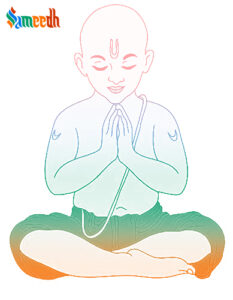Traditionally, Brahmins are considered the highest caste and are associated with priesthood, teaching, and other scholarly occupations. Their primary duty is to study and teach the Vedas, the sacred scriptures of Hinduism.

Brahmins are a social and religious category in Hinduism traditionally associated with priesthood, teaching, and scholarship. In the traditional Vedic social structure, Brahmins were considered the highest varna (social class) and were assigned the role of performing rituals, preserving sacred knowledge, and offering guidance on religious and moral matters.
Key roles and responsibilities of Brahmins in Hindu society include:
- Priesthood: Brahmins traditionally served as priests in religious ceremonies, performing rituals, and conducting worship. They were responsible for carrying out Vedic rituals and maintaining the sacred fire.
- Teaching and Education: Brahmins played a crucial role in the transmission of knowledge. They were teachers and scholars who passed down the sacred scriptures, particularly the Vedas, to the next generation. Education was highly valued in Hindu society, and Brahmins were often involved in imparting knowledge to the community. Education is regarded very highly in Sanatan Dharma.
विद्या नाम नरस्य रूपमधिकं प्रच्छन्नगुप्तं धनम्।
विद्या भोगकरी यशः सुखकरी विद्या गुरूणां गुरुः।
विद्या बन्धुजनो विदेशगमने विद्या परा देवता।
विद्या राजसु पूज्यते न तु धनं विद्याविहीनः पशुः॥
Vidyā nāma narasya rūpam adhikaṃ prachanna guptaṃ dhanam।
Vidyā bhogakarī yaśaḥ sukhakarī vidyā gurūṇāṃ guruḥ।
Vidyā bandhujano videśagamane vidyā parā devatā।
Vidyā rājasu pūjyate na tu dhanaṃ vidyāvihīnaḥ paśuḥ॥
Education is the true beauty of a person, a hidden and secret wealth. Education bestows enjoyment, fame, and happiness. It is the teacher of teachers. Education is a friend in foreign lands, and it is the supreme deity. Among kings, it is revered and not wealth. Without education, one is like a beast.
- Spiritual Guidance: Brahmins were expected to provide spiritual guidance to the community. They were often consulted for matters related to religious practices, ethical dilemmas, and matters of dharma (righteous duty).
It’s important to note that the role and status of Brahmins have evolved over time, and the influence of the traditional caste system has diminished in many contemporary Hindu communities. While some individuals still identify as Brahmins and may continue family traditions in priestly and scholarly roles, the broader Hindu society has diversified, and people from various backgrounds may now pursue these roles.
Additionally, modern Hinduism places emphasis on personal spiritual practice and the pursuit of knowledge by individuals from all social backgrounds, moving away from a rigid caste-based system. Many Hindus reject caste-based discrimination and promote the idea of spiritual equality for all.